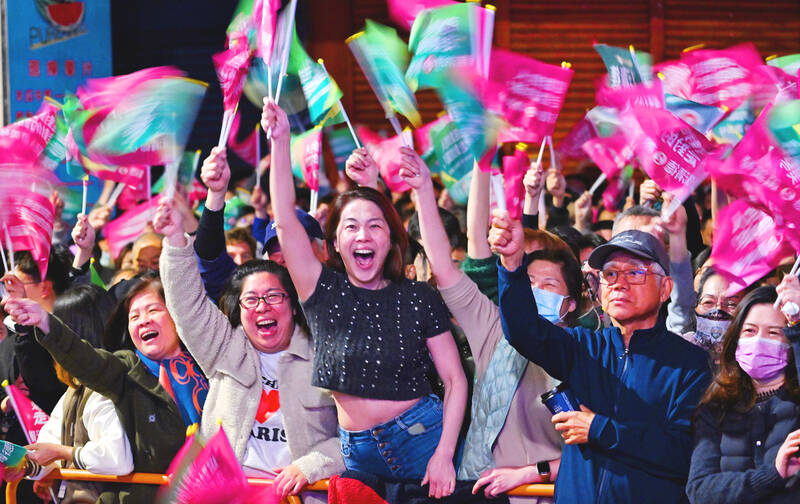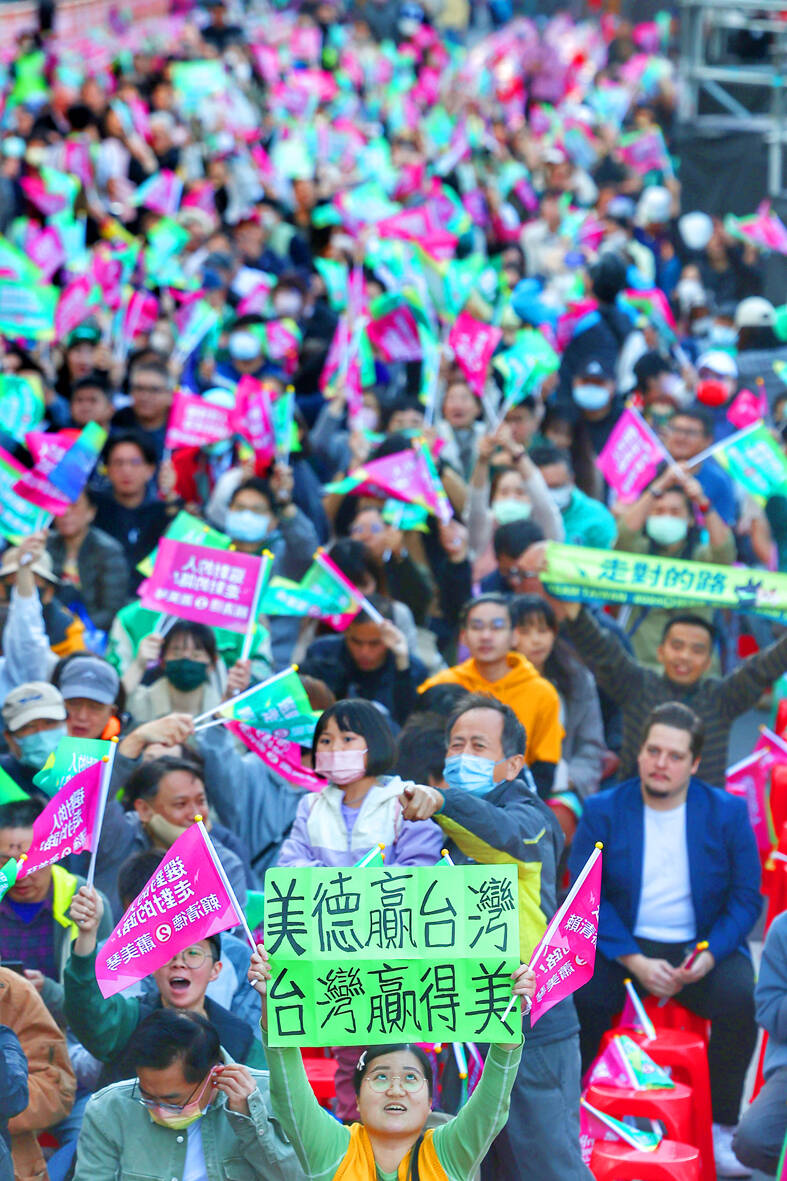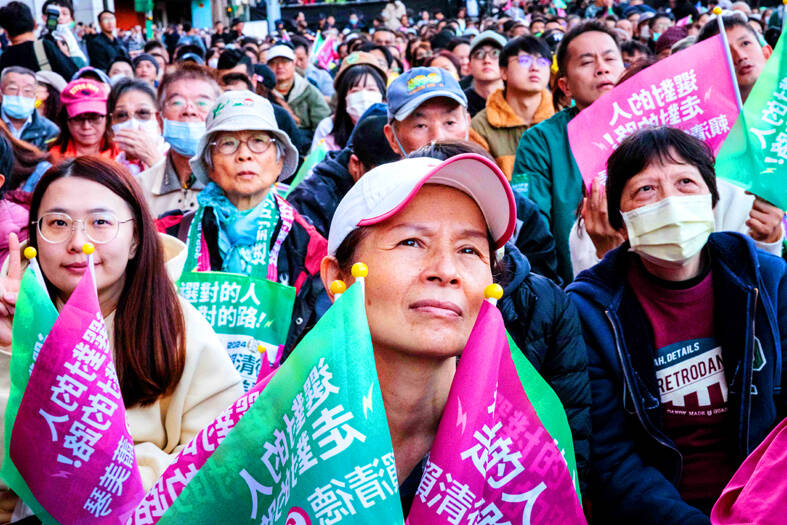Crowds packed the streets around the Democratic Progressive Party (DPP) headquarters in Taipei last night to celebrate its victory in the presidential election, giving Vice President William Lai (賴清德) and his party the mandate to lead Taiwan for the next four years.
DPP supporters cheered, shouted and waved flags as the vote tabulations were updated.
The ticket of Lai and former representative to the US Hsiao Bi-khim (蕭美琴) led from the initial tallies in the afternoon right through the evening.

Photo: Liu Hsin-de, Taipei Times
The festive atmosphere was also apparent in the crowd in front of Lai’s national campaign office near the Taipei MRT’s Shandao Temple Station, with people excitedly chatting and sending congratulatory messages as the results confirmed that President Tsai Ing-wen (蔡英文) would hand over the nation’s leadership to a successor from her own party.
The final count in the presidential race had the Lai-Hsiao ticket at 5,586,019 votes, or 40.05 percent of the total, the Chinese Nationalist Party’s (KMT) ticket of New Taipei City Mayor Hou You-yi (侯友宜) and Jaw Shaw-kong (趙少康) at 4,671,021 (33.49 percent) and the Taiwan People’s Party’s (TPP) ticket of party chairman Ko Wen-je (柯文哲) and Legislator Cynthia Wu (吳欣盈) at 3,690,466 (26.46 percent).
However, the jubilant mood for the Lai-Hsiao victory was tempered by the DPP losing some key contests in the legislative elections, resulting in the DPP not getting a majority in the legislature, although it retained most of the seats in its traditionally strong constituencies, especially in southern Taiwan.

Photo: CNA
DPP representatives at the party’s main rally emphasized the slogans that Lai and Hsiao had campaigned on.
“It is a victory for democracy,” “Let’s proceed on the right path” and “Lai will drive on the road of democracy to lead our nation forward,” they said, referencing the “On the Road” campaign advert in which Tsai handed over car keys to Lai.
Lai’s victory is one of unity for Taiwanese, they said, adding that the win marked a historic achievement: the first time in Taiwanese democratic history that a political party has won a third straight presidential term.

Photo: Yasuyoshi Chiba, AFP
The DPP is to remain in office after Tsai’s two consecutive terms beginning in 2016.
This would also be the first time that Taiwan has a former medical doctor as its leader, with Lai having a master’s degree in public health from Harvard University, as well as having practised medicine in Tainan, DPP officials said told the crowd.
A Taipei resident and DPP supporter surnamed Chuang (莊) in his 50s told reporters that Lai’s victory was a huge relief, as he had been anxious in the past few days upon seeing large crowds attending rallies for the KMT and the TPP.
“This is a win for Taiwanese,” Chuang said. “I am glad we still have democracy and freedom.”
“My family and I don’t want go back to the past authoritarian regime of the KMT,” he added. “The result is our message to the KMT and China that Taiwan is a sovereign country, and Taiwanese do not want to be ruled by communist China.”
At a DPP international news conference that started at 8:30pm last night, Lai said that his election had three important meanings:
First, Taiwan has told the world that in the choice between democracy and autocracy, Taiwanese have chosen democracy.
Second, Taiwanese have successfully defended their democratic system against external forces that have attempted to influence the elections, while sending a message to the world that they have the right to vote and to choose their own president.
Third, the DPP Lai-Hsiao ticket received the most support, with the most votes among the three political parties in the presidential race, he said.
Taiwanese have spoken, and they say that Taiwan is on the right road and will not go back to authoritarianism, he added.
Lai said that he will strive to maintain peace and prosperity across the Taiwan Strait, and would seek exchanges, interaction and dialogue with China, while he will uphold the Republic of China constitutional framework to work for the well-being of people on both sides of the Strait.

The Taiwanese passport ranked 33rd in a global listing of passports by convenience this month, rising three places from last month’s ranking, but matching its position in January last year. The Henley Passport Index, an international ranking of passports by the number of designations its holder can travel to without a visa, showed that the Taiwan passport enables holders to travel to 139 countries and territories without a visa. Singapore’s passport was ranked the most powerful with visa-free access to 192 destinations out of 227, according to the index published on Tuesday by UK-based migration investment consultancy firm Henley and Partners. Japan’s and

NATIONAL SECURITY THREAT: An official said that Guan Guan’s comments had gone beyond the threshold of free speech, as she advocated for the destruction of the ROC China-born media influencer Guan Guan’s (關關) residency permit has been revoked for repeatedly posting pro-China content that threatens national security, the National Immigration Agency said yesterday. Guan Guan has said many controversial things in her videos posted to Douyin (抖音), including “the red flag will soon be painted all over Taiwan” and “Taiwan is an inseparable part of China,” while expressing hope for expedited “reunification.” The agency received multiple reports alleging that Guan Guan had advocated for armed reunification last year. After investigating, the agency last month issued a notice requiring her to appear and account for her actions. Guan Guan appeared as required,

Japan and the Philippines yesterday signed a defense pact that would allow the tax-free provision of ammunition, fuel, food and other necessities when their forces stage joint training to boost deterrence against China’s growing aggression in the region and to bolster their preparation for natural disasters. Japan has faced increasing political, trade and security tensions with China, which was angered by Japanese Prime Minister Sanae Takaichi’s remark that a Chinese attack on Taiwan would be a survival-threatening situation for Japan, triggering a military response. Japan and the Philippines have also had separate territorial conflicts with Beijing in the East and South China

A strong cold air mass is expected to arrive tonight, bringing a change in weather and a drop in temperature, the Central Weather Administration (CWA) said. The coldest time would be early on Thursday morning, with temperatures in some areas dipping as low as 8°C, it said. Daytime highs yesterday were 22°C to 24°C in northern and eastern Taiwan, and about 25°C to 28°C in the central and southern regions, it said. However, nighttime lows would dip to about 15°C to 16°C in central and northern Taiwan as well as the northeast, and 17°C to 19°C elsewhere, it said. Tropical Storm Nokaen, currently